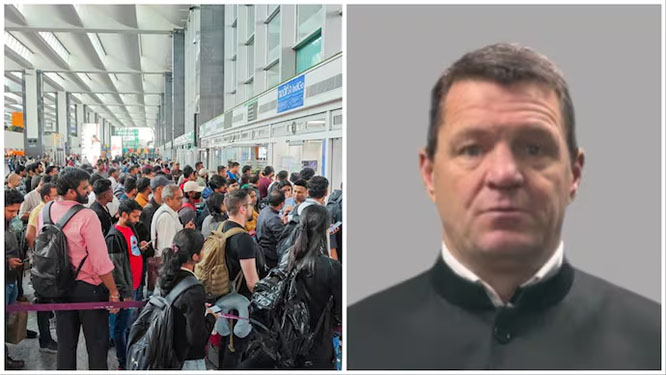
The patriarch of separatist politics in the Valley and Hurriyat leader, Syed Ali Shah Geelani, passed away at his residence in Srinagar late Wednesday night. A former elected legislator, the ailing 92-year-old had been under house detention for more than a decade.
His death comes when both his and the moderate factions of the Hurriyat are in disarray in the wake of a crackdown by the National Investigation Agency (NIA), the abrogation of Article 370 and the downgrade of Jammu and Kashmir into two Union Territories.
Apprehensive that his funeral may attract large crowds, the security establishment has imposed restrictions across the Valley, including Internet suspension. Police sources say curfew would be imposed.
“With shock and grief, we inform (you) that the father of revolution Syed Ali Geelani passed away tonight,” tweeted Geelani’s Pakistan-based representative Abdullah Geelani. “As per his will, he would be buried at the martyrs’ cemetery in Srinagar. The timing of the funeral would be announced later.”
However, it is unlikely that the government will allow Geelani to be buried at this cemetery.
Geelani’s legacy will be that of the hardliner who stood up to New Delhi, seeking resolution of the Kashmir dispute under the aegis of the United Nations. In fact, he was the only separatist leader to oppose Pakistan President Pervez Musharraf when the latter climbed down on Islamabad’s traditional stand on Kashmir and proposed a four-point formula to resolve the Kashmir issue.
Born on September 29, 1929, at Zurmanz, a village on the banks of the Wular lake in Bandipore, Geelani rose to become the face of separatist politics.
A school teacher, he started his political career under the tutelage of Maulana Mohammad Sayeed Masoodi, a senior National Conference (NC) leader, but soon moved to Jamat-e-Islami. The socio-religious organisation stood up to the NC leadership and saw Kashmir as an “unfinished agenda” of Partition.
Geelani’s electoral career started from Sopore, a traditional separatist and Jamat stronghold. He first contested the Assembly elections in 1972, and represented Sopore in the erstwhile Jammu and Kashmir Assembly for three terms. The last term ended abruptly in 1987 when militancy erupted in Kashmir.
Geelani had been one of the four candidates of the Muslim United Front (MUF) — an alliance of political, social and religious organisations — who won in the widely rigged 1987 elections that brought the NC-Congress combine to power and set off militancy in the Valley.
An ardent supporter of armed struggle for resolution of the Kashmir issue, Geelani was among the seven executive members of the Hurriyat Conference when it was formed in 1993. But his support for militancy and unwavering ideology on Kashmir sowed the seeds of discord between him and his colleagues in the Hurriyat Conference, finally culminating in a split in 2003.
In 2004, Geelani also parted ways from Jamat-e-Islami when it distanced itself from militancy, and formed his own political outfit, Tehreek-e-Hurriyat.
While Geelani has been bedridden for years now and incommunicado for the last two years, he sprang a surprise on June 30 last year when he dissociated himself from the faction of Hurriyat that he founded. He left the reins to his deputy Mohammad Ashraf Sehrai, who died in custody in Jammu jail earlier this year.
And though Geelani said he wanted the resolution of the Kashmir issue as per the aspirations of the people, he himself was an ardent supporter of its merger with Pakistan. Last year, the Pakistan government awarded him with Nishan-e-Pakistan, the highest civilian honour of the country.
The NIA, which has till date arrested 18 separatist leaders from Kashmir including those from the Hurriyat in a case of terror funding, has alleged that they received funds from Pakistan to foment unrest in the Valley. The agency had even named Geelani and Mirwaiz Umer Farooq in the chargesheet, claiming they had been pushing for secession and fuelling unrest but had stopped short of naming them as accused.
In February, 2019 the NIA had raided Umer Farooq’s and Geelani’s son Naseem Geelani’s house among others in the case. In March 2019, the Enforcement Directorate had levied a penalty of Rs 14.40 lakh on Geelani in a 17-year-old case of alleged illegal possession of $10,000 in alleged contravention of the foreign exchange law.
Former chief minister and PDP chief Mehbooba Mufti condoled Geelani’s demise, saying, “We may not have agreed on most things but I respect him for his steadfastness and standing for his beliefs.”
People’s Conference leader Sajad Lone tweeted: “Heartfelt condolences to the family of Syed Ali Shah Geelani sahib. Was an esteemed colleague of my late father. May Allah grant him Jannat”.







Comments
Add new comment